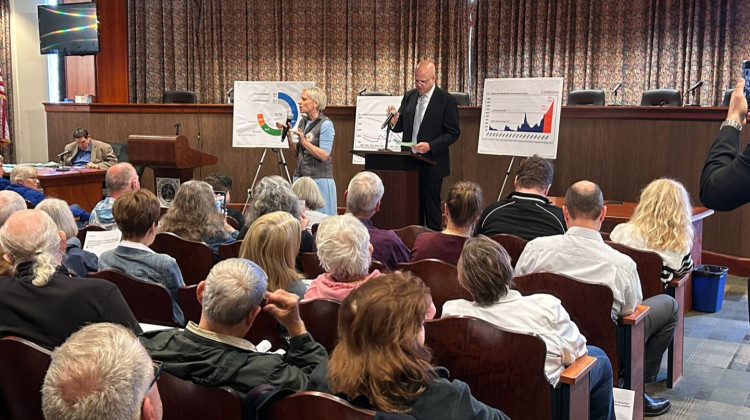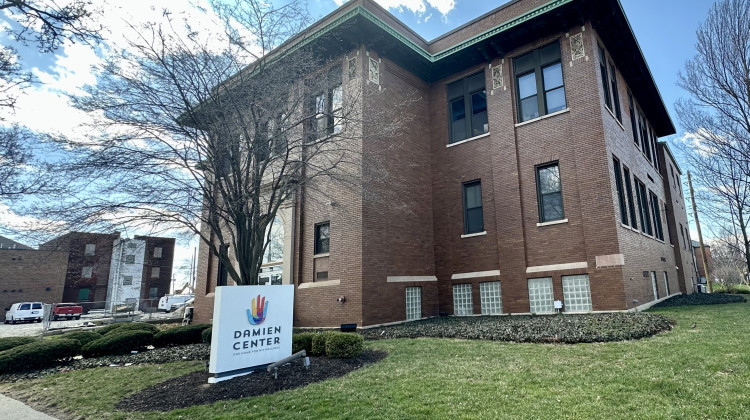
Some homes in West Calumet Housing Complex are already boarded up ahead of Friday's deadline for the 60 or so families left there to move out.
Lauren Chapman/IPBFriday, March 31 is the last day for families in East Chicago’s lead-contaminated public housing complex to move or be moved – and despite strenuous opposition from residents and lawyers, officials say they have to enforce that deadline.
Keeshea Daniels’ last days at West Calumet Housing Complex haven’t been easy. Last week, between apartment-hunting and driving her kids all around the state, she started feeling itchy.
“I thought I might have had an allergic reaction or something. Oh, no, I have shingles again for the fifth time since October,” she says. “So I really couldn’t rest while I was in Indianapolis because I knew something was brewing, but I didn’t know, to this magnitude, what was going to happen to us.”
A few days later, Daniels learned she might have to temporarily move to Chicago’s South Side while she kept looking for permanent housing. West Calumet Housing Complex is slated for demolition, and Daniels has struggled to find affordable housing nearby. Her deadline to secure something or face relocation is Friday.
“It would have been ‘no,’ but I wasn’t even asked – we were just told where we were going,” she says. “And putting me on the South Side of Chicago is like putting a deer in the middle of Cline Avenue. You know, you don’t belong there! I don’t belong in Chicago, because I’m from Indiana.”
Attorney Emily Coffey of the Shriver Center on Poverty Law calls the prospect “devastating.” She’s encouraging Daniels and other residents to file grievances with the city over their temporary housing assignments.

Coffey says the city shouldn’t be forcing the moves with so many families still living in the complex – at least 60 at last count.
“The federal housing officials and the local housing officials have seriously failed to consider how much this is going to harm the families at West Calumet,” Coffey says. “They’ve already been through too much.”
She argues officials haven’t done enough to help the residents find good long-term housing options.
The move-out deadline was set in a federal settlement in November. It also mandated moving cost reimbursements and special housing counselors who focus on helping residents improving their quality of life. But residents say those resources were slow to come through.
The Department of Housing and Urban Development has been helping the city deal with all this, and deputy regional administrator Jim Cunningham says they’ve done their best to move quickly in an unprecedented situation.
As for the temporary moves, Cunningham says those were the East Chicago Housing Authority’s call.
“What we authorized at HUD was the ability for [the Housing Authority] and the local community to determine whether or not they’re going to do this emergency transfer,” he says, “based on the fact that there [are] still high levels of lead on the site, as well as public safety concerns that they had.”
The city initially ordered residents out of West Calumet when severe lead contamination was found in the soil last summer. Now, as the neighborhood’s population dwindles, officials are concerned crime or squatting – which residents and lawyers say isn’t an issue.
City officials and their attorneys declined multiple requests for comment on why they’ve chosen to enforce Friday’s deadline.
About three-fourths of the homes in West Calumet are vacant now. Several doors are boarded up, and the curtains in some windows open onto empty living rooms.
But Daniels still lives here until Friday. Her living room is full of the same boxes she’s had packed since September, when the Environmental Protection Agency cleaned up lead dust inside her house.
“I’m kind of worried about moving to Zone 3” of the EPA’s USS Lead Superfund site, Daniels says. “But I have to leave here, so.”
Zone 1 of the Superfund is West Calumet Housing Complex. Months after Daniels was told she’d have to leave this place, she’s staring down a deadline she says she’s not prepared for.
“But if push comes to shove, I’ll be out,” she says. “I can go stay with my granny. That’s what I have to do – I just can’t move to Chicago right now. I don’t see it.”
Daniels’ grandmother lives in Zone 2 of the Superfund.
It means that either way, on Friday, Daniels will leave West Calumet and the Superfund’s worst contamination for somewhere else in the contaminated zone.
 DONATE
DONATE








 Support WFYI. We can't do it without you.
Support WFYI. We can't do it without you.